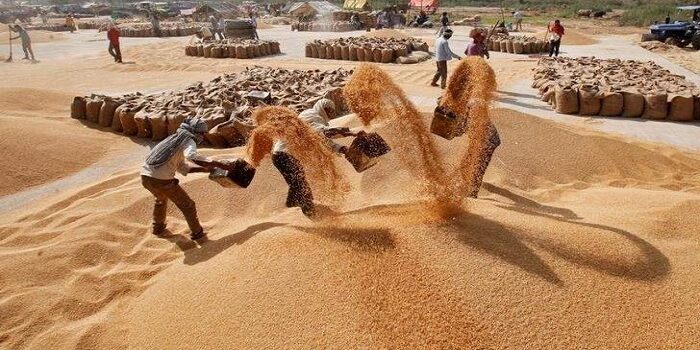The Indian Parliament passed three agriculture act the new farm bill Farmers’ Produce Trade and Commerce (Promotion and Facilitation) Act, 2020, Farmers (Empowerment and Protection) Agreement of Price Assurance, Farm Services Act, 2020, and the Essential Commodities (Amendment) Act, 2020—during its monsoon session culminating on 23 September.
One of the most significant members of society is a farmer. He is the foundation of the economy of India. All the economic development in the country is possible only if the farming community is taken care of on a priority basis. More than 15 percent of India’s GDP is accounted for by the agricultural industry. As well as the agricultural industry, India has the largest number of employees.
The contentious bills which received the President’s sign-off on September 27, 2020, were passed amid an uproar by opposition party leaders and farmer groups alike.
Amid the stiff opposition, there have also been voices that have come out in support of the acts, stating that they would “unshackle” the workforce engaged in the agriculture sector.
-
Farmer’s Produce Trade and Commerce (Promotion and Facilitation) Act, 2020
This act allows farmers to engage in trade of their agricultural produce outside the physical markets notified under various state Agricultural Produce Marketing Committee laws (APMC acts). Also known as the ‘APMC Bypass Bill’, it will override all the state-level APMC acts.
- Promotes barrier-free intra-state and inter-state trade of farmer’s produce.
- Proposes an electronic trading platform for direct and online trading of produce. Entities that can establish such platforms include companies, partnership firms, or societies.
- Allows farmers the freedom to trade anywhere outside state-notified APMC markets, and this includes allowing trade at farm gates, warehouses, cold storage, and so on.
- Prohibits state governments or APMCs from levying fees, cess, or any other charge on farmers’ produce.
-
Farmers ( Empowerment and Protection ) Agreement of price Assurance and farm services act, 2020
The act seeks to provide farmers with a framework to engage in contract farming, where farmers can enter into a direct agreement with a buyer (before sowing season) to sell the product to them at pre-determined prices.
- Entities that may strike agreements with farmers to buy agricultural produce are defined as “sponsors’’ and can include individuals, companies, partnership firms, limited liability groups, and societies.
- The Act provides for setting up farming agreements between farmers and sponsors. Any third parties involved in the transaction (like aggregators) will have to be explicitly mentioned in the agreement. Registration authorities can be established by state governments to provide for an electronic registry of farming agreements.
- Agreements can cover mutually agreed terms between farmers and sponsors, and the terms can cover supply, quality, standards, price, as well as farm services. These include the supply of seeds, feed, fodder, agrochemicals, machinery and technology, non-chemical agro-inputs, and other farming inputs.
- Agreements must have a minimum duration of one cropping season or one production cycle of livestock. The maximum duration can be five years. For production cycles beyond five years, the period of agreement can be mutually decided by the farmer and sponsor.
- The purchase price of the farming produce—including the methods of determining the price—may be added to the agreement. In case the price is subject to variations, the agreement must include a guaranteed price to be paid as well as clear references for any additional amounts the farmer may receive, like bonus or premium.
- There is no mention of minimum support price (MSP) that buyers need to offer to farmers.
- Delivery of farmers’ produce may be undertaken by either party within the agreed time frame. Sponsors are liable to inspect the quality of products as per the agreement, otherwise, they will be deemed to have inspected the product and have to accept the delivery within the agreed time frame.
- In the case of seed production, sponsors are required to pay at least two-thirds of the agreed amount at the time of delivery, and the remaining amount to be paid after due certification within 30 days of the date of delivery. Regarding all other cases, the entire amount must be paid at the time of delivery and a receipt slip must be issued with the details of the sale.
- Produce generated under farming agreements is exempt from any state acts aimed at regulating the sale and purchase of farming produce, therefore leaving no room for states to impose MSPs on such produce. Such agreements also exempt the sponsor from any stock-limit obligations applicable under the Essential Commodities Act, 1955. Stock limits are a method of preventing hoarding of agricultural produce.
- Provides for a three-level dispute settlement mechanism: the conciliation board—comprising representatives of parties to the agreement, the sub-divisional magistrate, and appellate authority.
-
Essential Commodities (Amendment) Act, 2020
An amendment to the Essential Commodities Act, 1955, this act seeks to restrict the powers of the government concerning the production, supply, and distribution of certain key commodities.
- The act removes cereals, pulses, oilseeds, edible oils, onions, and potatoes from the list of essential commodities.
- Government can impose stock holding limits and regulate the prices for the above commodities—under the Essential Commodities, 1955—only under exceptional circumstances. These include war, famine, extraordinary price rise, and natural calamity of grave nature.
- Stock limits on farming produce to be based on price rise in the market. They may be imposed only if there is:
- a 100 percent increase in the retail price of horticultural produce, and
- a 50 percent increase in the retail price of non-perishable agricultural food items. The increase is to be calculated over the price prevailing during the preceding twelve months, or the average retail price over the last five years, whichever is lower.
- The act aims at removing fears of private investors of regulatory influence in their business operations.
- Gives freedom to produce, hold, move, distribute, and supply products, leading to harnessing private sector/foreign direct investment in agricultural infrastructure.
PROS & CONS OF THE NEW FARM BILL
PROS OF THE NEW FARM BILL
- The farmers had moved towards a freer and more flexible system.
- Selling produces outside the physical territory of the mandis will be an additional marketing channel for the farmers.
- The new bill has not brought any major drastic changes, only a parallel system working with the existing system. Before these bills, farmers can sell their produce to the whole world, but via the e- NAM system.
- The amendment to the Essential Commodities Act which is one of the three bills under protest removes the scare or fear of the farmers that traders who buy from farmers would be punished for holding stocks that are deemed excess and inflicting losses for the farmers.
- The bills ensure that the farmer or the producer is given the same attention as production is and the farmer gets the stipulated price for crops so that farming survives.
- Prime minister Narendra Modi tweeted on September 20th, that the “system of MSP will remain” and “government procurement will continue”. The Agriculture Minister also stated that past governments actually never thought it mandatory to introduce a law for MSP.
- In the existing APMC system, farmers must go through a trader (via Mandis) to sell their products to consumers and companies and they receive Minimum Selling Prices for their produce. This very system has influenced the rise of a cartel led by traders and uncompetitive markets due to which the farmers are paid MSP (a very low price) for their produce.
CONS OF THE NEW FARM BILL
- The Farm Bill hampers the monopoly of APMC (agricultural produce market committee) mandis, thereby allowing the sale and purchase of crops outside these state government-regulated market yards or mandis.
- The Farmers’ Produce Trade and Commerce (Promotion and Facilitation) Bill does not give any statutory backing to MSP. The farmers have nothing to do with the legal system but everything to do with the MSP, a price at which they sell their produce, there is not even a mention of either “MSP” or “Procurement” in the said bill.
- The government declares MSPs for crops, but there has been no law mandating their implementation.
- The only crop where MSP payment has some statutory implementation is sugarcane for which FRP is determined. This is due to its pricing being governed by the Sugarcane (Control) Order, 1966 issued under the Essential Commodities Act.
- The new farm bill is placing farmers and traders at the mercy of civil servants, rather than of the courts.
Q.WHY ARE THE FARMERS PROTESTING OVER THE NEW FARM BILL?
A majority of farmers who may stand to gain from further decisions proposed by the new legislation may not support the old system. On the other hand, in ‘mandis’ the bills are likely to affect influential ‘commission agents’ (known as ‘arhatiyas’ in Punjab and Haryana) who don’t want to lose their control on farmers.
Due to the ‘Mandi Tax’ loss, a decent source of revenue, the state governments of Punjab and Haryana will be most affected.
The ‘arhatiyas’ would also lose their commissions and their traditional business, officials have explained.
Since the previous functions as informal bankers without collateral within the times of need, Arhatiya and farmer relations are close. But the legislation, the governing body said, did not fully do away with the system and added an alternative instead. The worries of dismantling the MSP system were wrong.
The issues and concerns presented by the protesters include the end of the ‘minimum support price’ (MSP) scheme in due course, the irrelevance of the ‘mandis’ of the state-controlled Agricultural Produce Market Committee (APMC), the possibility of losing land rights under the rule of contract farming, reduction in farm product prices due to the dominance of the market by large agro-businesses and the exploitation of farmers by large contractors by contract farming provisions.
A VIEWPOINT
The debate over the farm bill 2020 has generated more heat than light. Farmers across Punjab, Haryana, and Kerala are majorly protesting against the first two bills related to trade & commerce and assurance of price. The farmers’ protection is also getting support from various political parties like Congress, AIADMK, TMC, RJD, SAD, BSP, etc. The opposition parties have collectively called it a “sell-out to corporate interests”.
The simplest solution against the protest of the farmers concerning the farm bills can be including statutory backing to the minimum selling prices and procurement in the new bill to eradicate the fear of the farmers. Giving farmers the choice to sell without the help of middlemen will be of great use only if there are roads that link villages to markets, climate-controlled storage facilities, the electricity supply is made reliable and available to power those facilities, and food processing companies who compete to buy their produce.
This fear of losing their basic income arising out of that land can’t be truer when there is really no such provision and discussion relating to any dispute resolution mechanism in these three bills. Many people have called it the “era of draconian laws” be it the industrial labor act to this present day discussed bill relating to farmers. The issue is that maybe a few farmers find these bills attractive in the beginning but in the end when they will be not given the proper opportunity to negotiate the desired price, they won’t have a backup option either. The government can make the farmers understand the purpose of these acts and can also remove their difficulties by reconsidering the relevant provisions of these acts where the farmers have any obligation.









